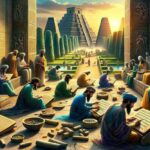The Dark Side of History: Centuries of Shocking Truth Revealed
History has long been depicted as a richly colored tapestry replete with the highlights of human accomplishment and advancement. Yet, behind the gilded facade exists a darker, more nuanced history — a dark side to history that has been hidden, distorted, or expunged. These startling realities have been buried for centuries, but they have been influencing our world in ways we are only now coming to comprehend. So, why is it important to explore these hidden parts of history, and what exactly are these buried secrets?
Why Explore the Dark Side of History?
If history is a tale, then all tales have shadows. The shadow history confronting us are unpleasant realities—atrocity, betrayal, and injustice that don’t fit the clean, heroic narratives we love to hear. Such realities need to be examined because it allows us to gain a complete picture of human experience, learn from blunders in the past, and construct a better, more truthful future.
What Makes Historical Truths Shocking?
At other times, the most surprising historical facts are those that concern broadly accepted numbers or occurrences. When betrayed, crimes, or institutional repression come to light through new evidence, they undermine long-held convictions. These discoveries can make cultural identities and national narratives unstable, compelling societies to reconsider their beginnings and values.
The Concept of Hidden History
History vs. History Written
The history that we learn is not necessarily the history which occurred. It’s colored by the people who wrote it—frequently winners, conquerors, or dominant classes who were powerful enough to dictate the narrative. This narrative selection has produced blind spots and silenced the voices of marginalized peoples.
Who Narrates?
Throughout history, elites, religious institutions, and governments have controlled information dissemination. They determine what is documented, stored, or eliminated. This power relationship informs us of why certain facts remain concealed or altered.
Examples of Concealed or Altered Historical Events
The Colonization and Its Untold Stories
Colonization is presented as exploration and advancement, but the harsh reality entails genocide, cultural destruction, and slavery. The plight of indigenous peoples was deliberately downplayed or silenced in textbooks for centuries.
Forgotten Horrors of the World Wars
Though World War II is well-documented, numerous atrocities committed by all parties have yet to be fully exposed. As an instance, large-scale civilian fatalities in less publicized theatres or war crimes perpetrated by winning belligerents tend to go unrecognized.
Repressed Indigenous Histories
Numerous indigenous societies have rich histories hidden or erased by colonizers as myths. Their suffering, knowledge systems, and contributions were concealed from mainstream histories.
The True Story Behind Well-Known Personalities
Historic heroes weren’t all heroes. Nation-builders lionized today may have had the role of oppressor or corrupter as well. These facts were often omitted in official histories.
The Effect of Censorship and Propaganda
Political Agendas behind Manipulation of History
History is an instrument of great power to legitimize present regimes or ideologies. It has consequently resulted in censorship, destruction of records, and propaganda that alters public memory.
Role of Media and Education Systems
Collective memory is influenced by textbooks, museums, and media. When these are politicized or controlled, the public is generally provided with a sanitized or indoctrinated version of history.
Archaeological Findings That Defy Mainstream History
Ancient Civilizations Far More Advanced Than Assumed
Current archaeological discoveries imply that certain historical civilizations possessed knowledge and technologies once considered impossible, contradicting the linear model of history.
Lost Technologies and Overlooked Knowledge
Technologies like sophisticated metallurgy or engineering discovered in ruins contradict our presumptions regarding the capabilities of ancient civilizations.
Conspiracy Theories vs. Authenticated Hidden Facts
Myth vs. Reality
Not all secret history assertions are fact. Carefully scrutinizing evidence and not sensationalising, remaining receptive to new information, is essential.
The Significance of Critical Thinking
Exposure to various sources and expertise aids in traversing the gray areas between conspiracy and historical fact.
Modern Technology’s Role in Revealing Concealed History
Digital Archives and Open Data
Digitization of archives and records across the globe has made it easier to access historical information, and therefore, discover previously untold facts.
AI and Machine Learning for Historical Research
AI software examines huge data volumes to recognize patterns, discrepancies, or interrelations not seen by human researchers before.
Ethical Guidelines When Unveiling Dark Truths
Sensitivity to Involved Communities
Unveiling surprising historical facts must be done with caution to prevent re-traumatization of communities or sparking new conflicts.
Balancing Truth and Respect
Historians have to walk on the tightrope of transparency and sensitivity so that the truth is used for healing and not for injury.
How Hidden Truths Transform Our Perception of Today
Lessons from History
Embracing the sinister aspect of history can lead to social justice and reconciliation.
Rethinking Cultural and National Identities
New truths redefine identity stories, enabling societies to evolve above old myths.
Conclusion
The dark past contains secrets many would prefer to keep buried. But those concealed histories are crucial for a complete knowledge of humanity’s history. By facing appalling truths, we open the door to a better-informed, fairer, and more empathetic future. History is not merely in the past—it is the cornerstone of what we are today and what we hope to become.
FAQs
Why have some historical truths been concealed for centuries?
Due to power relations, censorship, propaganda, and wanting to shield certain histories or identities.
Is it possible to ever know the whole truth about history?
Though whole truth is difficult to achieve, research continues and technology helps us get closer to a fuller picture.
How do historians authenticate contentious events?
By critical analysis of several sources, archaeological findings, and peer review.
What is the contribution of technology towards bringing us hidden history?
Technology facilitates quicker data analysis, improved preservation, and more access to information.
How should societies respond to shocking revelations about the past?
With openness, sensitivity, and a willingness to learn and to reconcile.


